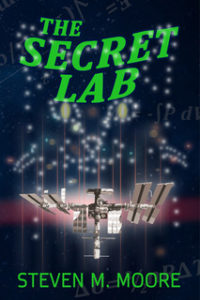Computer games…
I once played bridge and chess, the latter even on a computer, but found they took too much time away first from courses, then work, and finally my writing. I dabbled in Myst—also time consuming…and maybe too much like writing a novel! But the Fearsome Four in The Secret Lab are into RPGs. How’d I pull that off? (I’m speaking to the first edition. A. B. Carolan, who wrote the previous short story, rewrote and reedited it for the second edition as the first entry in his “ABC Sci-Fi Mysteries” for young adults.)

By RPG, I mean “role-playing game,” not “rocket-propelled grenade,” heaven forbid. Of course, the kids on the International Space Station in the future know all about VR and AI, and that role playing aided by the station’s AI is an intense experience for them, especially when some nefarious person hacks into it. My imagination allowed me to extrapolate today’s situation to that future, and it was far enough into the future that one can’t really check how accurate my extrapolation might be.
Consider The Secret Lab my only bow to computer games. Computers can be found in A.B. and my stories—two main characters in The Chaos Chronicles Trilogy Collection are absorbed by an ET AI—but I don’t care for our current computer games. The reasons are simple: First, their storylines are generally non-existent or extremely limited. They can’t begin to compete with a well-written book. Second, they’re generally all action with no contemplative interludes. The exceptions are those RPGs that take some creative skill on the part of the participants.
Cyberpunk certainly inspired some of my plotting involving computers, but it was more inspired by Frederik Pohl (his HeeChee Trilogy motivated me more than William Gibson’s Neuromancer). In general, I believe that the integration of humans and machines will occur in surprising ways in the future as neuroscience and computer technology advance and the borders separating them become fuzzier. This probably won’t lead to anything as insidious as Star Trek’s Borgs. In fact, it might be driven by health and longevity concerns—the inverse problem of Alzheimer’s is an alert and creative mind trapped in a dying body. Allowing someone like Hawking to continue theorizing for a few more years isn’t a bad goal (in fact, he did so for a while, thanks to technology), although it might seem ghoulish to some. (This is a major theme in the HeeChee Trilogy.)
There’s one aspect of computer games that’s useful and might have more staying power—virtual reality. That also plays a limited role in my The Chaos Chronicles Trilogy Collection. There a simple meeting can take place with AI assisted VR where the participants can believe they’re together face-to-face, for example, through sophisticated VR and holographic techniques. No games, just VR.
While computer games are mostly frivolous pastimes in spite of the tournaments you used to see on some cable TV channels (there’s a hiatus now because of COVID-19, although I have no idea why they can’t do it remotely), the associated technologies can be generalized. Sci-fi writers’ imaginations can explore those extrapolations farther than game programmers could ever imagine.
***
Comments are always welcome.
In these troubled times, anthologies and collections offer readers small and varied bites of reading entertainment if they’re lacking the time to become immersed in a novel. The #WolfPackAuthors’ Once upon a Wolfpack and Howling at the Moon are anthologies of short fiction and poetry that offer very tasty bites indeed, and all royalties go to good causes. Yours truly has a short story in the second anthology. You can complement those two with some of my own, a few at Amazon and others for free—see the list of PDFs on the “Free Stuff & Contests” web page where you can download with only a few clicks. Enjoy!
Around the world and to the stars! In libris libertas!
